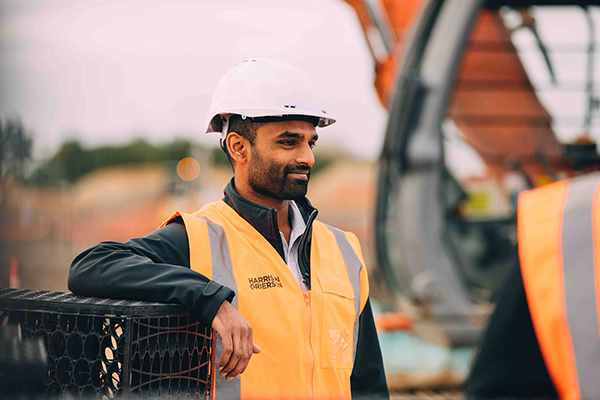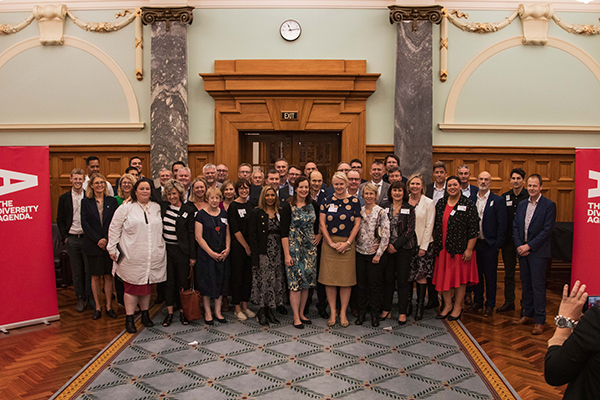Finalist

When the Diversity Agenda launched in 2018 with the goal of improving the dire number of women working in engineering and architecture, a survey of its members showed that females filled just 20 per cent of qualified roles in these professions.
Two years later, that figure had risen to 31 per cent. Leadership roles filled by women rose from 16 per cent to 22.5 per cent in the same period and the number of Māori in qualified roles in engineering and architecture increased from two per cent in 2018 to six per cent in 2020.
Launched in April 2018 by Te Ao Rangahau Engineering New Zealand, ACE New Zealand and Te Kāhui Whaihanga New Zealand Institute of Architects, initially to increase female representation, the Diversity Agenda has broadened its focus to all facets of diversity and inclusion to become a leading initiative for change in the engineering and architecture professions.
Signing up as a member is a way for businesses working in these sectors to demonstrate they are serious about diversity and inclusion and for them to benefit from access to resources, events, tips and tools, says Programme Lead Sean Barker.
Membership has grown from 44 firms at launch to 106 this year.
“Our goal is to help engineering and architecture firms become more diverse and inclusive through awareness, empowerment and action,” Sean says. “We want our professions to represent all of New Zealand society, where every engineer and architect feels safe and valued in their workplace, and make sure the professions are an inspiring career option for all Kiwi kids.”
Chief Executives from 45 member companies have made a deeper commitment to change by signing the Diversity Accord, making themselves publicly accountable for measuring and reporting on diversity statistics and progress on issues such as pay equity, eliminating bullying and harassment and uncovering barriers to equity in systems, practices and processes.
Signatories to the Accord, which was launched in 2020, will take part in an annual summit where they can share learnings, and a peer accountability model helps organisations meet their obligations within a safe, encouraging environment.
“If signatories don't meet their obligations, we have the right to remove Accord status from firms which means we can now push our firms more than ever before,” says Sean.
The Diversity Agenda also uses its powerful collective strength to raise awareness about the latest diversity statistics, share the voices of people within the professions through events, its website and email newsletters and empower firms to change by researching and creating resources in areas such as recruitment, policy, work environment and language.
Resources are limited - the Diversity Agenda has no fulltime employees so operates by sharing staff from its three founding organisations and has to use its limited time effectively and agilely to produce results.
“We realise how integral senior leadership is to bring actual change, as ultimately they are the ones that can drive action within firms,” says Sean.
Quarterly Diversity Agenda CE Roundtable events connect senior leaders to discuss diversity and inclusion. To create a broader platform for those senior voices, a monthly Big Interview series has been created to enable those leaders to share their knowledge.

The Diversity Agenda has also looked to utilise skills and knowledge from other organisations that can help with the journey, including the Construction Sector Accord, and has established good relationships within government to garner support for the work it’s doing.
“We're also not afraid of having the hard conversations, whether through our initial launch and #statsthatsuck which highlighted that 29 per cent of women leave the engineering and architecture professions within the first five years, or events such as our 'Māori in construction' webinar which gave a much-needed channel for Māori engineers and architects to discuss the struggles they've endured through working in heavily Pakeha-loaded environments that often aren't appreciative of te ao Māori.”
Members are quick to extol the benefits the initiative brings.
“As a boutique firm, it can be challenging to get access to experts, research and insights into leading practice in similar industries,” says BVT Engineering CEO Ceinwen McNeil. “As a Diversity Agenda member, I’ve been provided with access and the ability to ensure our organisation draws on all of their resources, especially through its far-reaching network. As a result, we have been able to exceed our expectations in driving diversity and inclusion. This in turn has lifted our internal and external performance and we produce better services, anticipate risk and drive innovation across our sector.”
Aurecon New Zealand Managing Director Tracey Ryan says the company signed up to the Diversity Accord as part of its commitment to diversity and inclusion and to be part of the movement for change. “We are deeply committed to improving diversity and inclusion within our industry and we are not afraid to stand up and be held accountable. The Accord is an opportunity for us to be challenged.”






